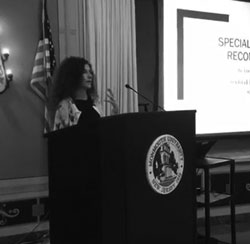Monmouth hosted special education lawyer Lori Gaines of Barger & Gaines on Thursday, April 6 in the Wilson Hall Auditorium.
The goal of the lecture was to lead a timely conversation surrounding the recent U.S. Supreme Court decision in Endrew F. v. Douglas County School District as part of its lecture series called “Special Education Reconsidered.” The event was hosted by the Department of Education and was moderated by Dr. Stacy Lauderdale, Department Chair and assistant professor.
Dr. John Henning, the Dean of the School of Education, said, “The School of Education is split into four departments, with special education being one of those departments.”
This event was just one of numerous ways that the department recognizes special education. They have also taken part of programs such as the Autism MVP Associate and Autism Awareness month.
The speaker, Lori Gaines, has a background in special education. She said that when she was in high school, she volunteered at a special education program in Marlboro, and never looked back.
Gaines began her career as a special education teacher and increasingly found herself advocating for her students. Eventually, she decided to pursue her advocacy by attending law school at the University of San Diego. Since 2005, she has practiced exclusively in the area of special education law.
She discussed the recent development in special education because of the outcome in Endrew F.
Traditionally, Federal law requires school districts to provide students with special needs a “free appropriate public education.” But since the question was considered in a Supreme Court case in 1982, various courts have adopted varying standards.
Gaines said that the Third Circuit, in which New Jersey is part of, has one of the highest standards for special education. The standard is that public schools must provide an education that create a “significant and meaningful benefit.” However, other circuits have a much lower standard like the Tenth Circuit in which Endrew F. came from.
The main question is, “what would a reasonable standard be?” The Tenth Circuit just provided a basic floor for special education students. Gaines referred to their standard as “de minimis,” which is defined in Webster’s Dictonary as “lacking significance or importance.”
Inconsistencies in the standard led the high court to consider this issue in the Endrew F. case, which was argued in January 2017.
The case included a minor with autism who had received individualized special education through the fourth grade. His parents rejected the school district’s proposed plan for his fifth grade year and placed the child in a private school. The parents then sought reimbursement for expenses incurred through the Individuals with Disabilities Education Act (IDEA).
A federal district court and the Tenth Circuit Court of Appeals ruled that the district did not have to reimburse Endrew’s parents.
On March 22, 2017, the Supreme Court issued a unanimous opinion, authored by Chief Justice John G. Roberts, which vacated and remanded the judgment of the Tenth Circuit Court of Appeals.
The court held that IDEA requires schools to offer children an education plan that would enable progress that would be appropriate to the individual needs of the child. The court declined to create a uniform rule for determining the adequacy of an individualized education plan.
Gaines was particualarly excited about the ruling because she had just finished a case that worked it’s way to the Third Circuit concerning a special education child in which she won.
Lauderdale said of the conversation, “It was great because now everybody can have a broad understanding of the law and what special education students can achieve.”
Alana Bielski, who is a graduate student getting her Master’s in Education with a Special Education endorsement, said, “As future special education teachers, you have a better outlook on what can be expected and accomplished by students. This event definitely helped me gain that outlook.”
photo taken from Monmouth Facebook Page



